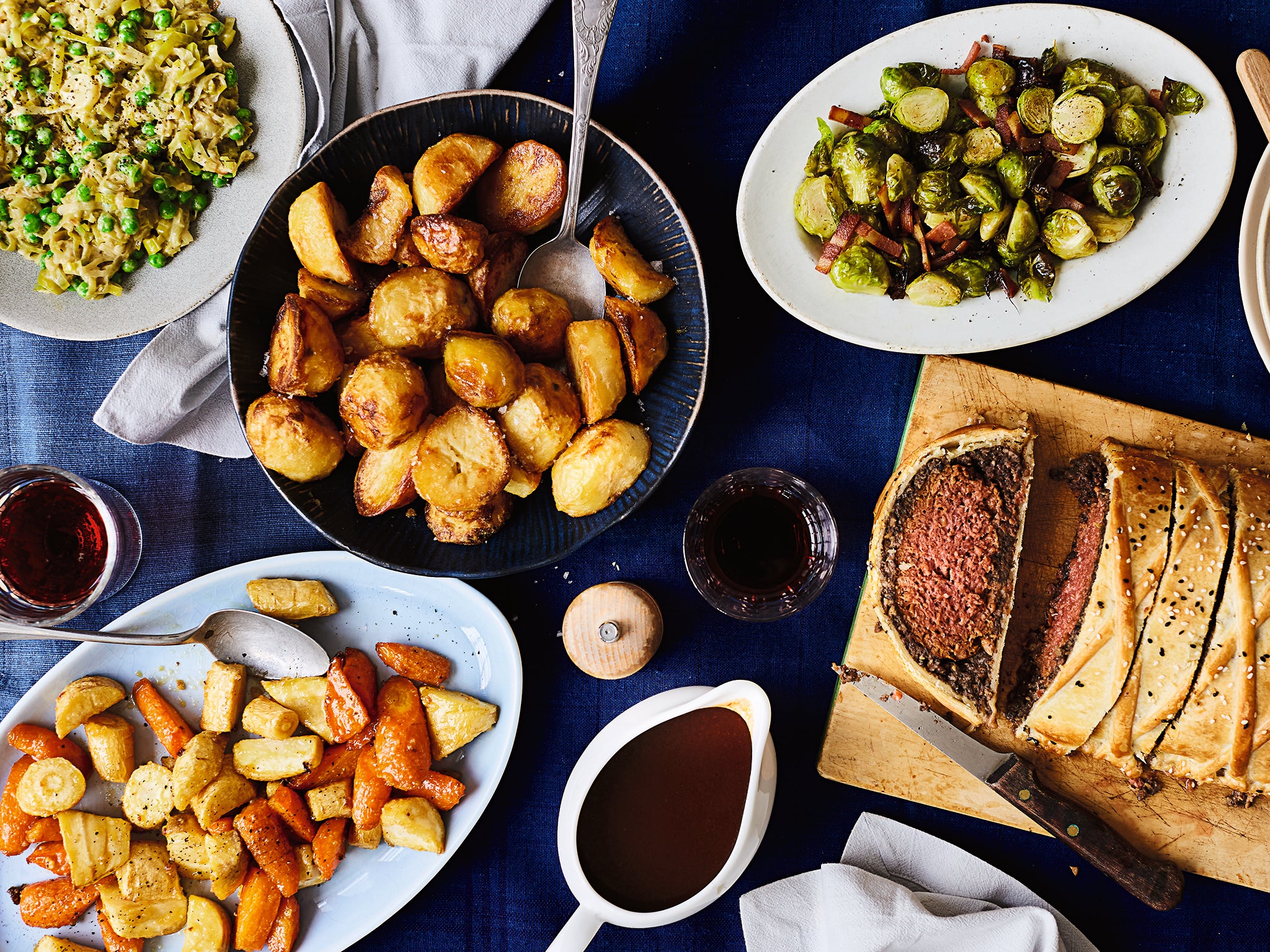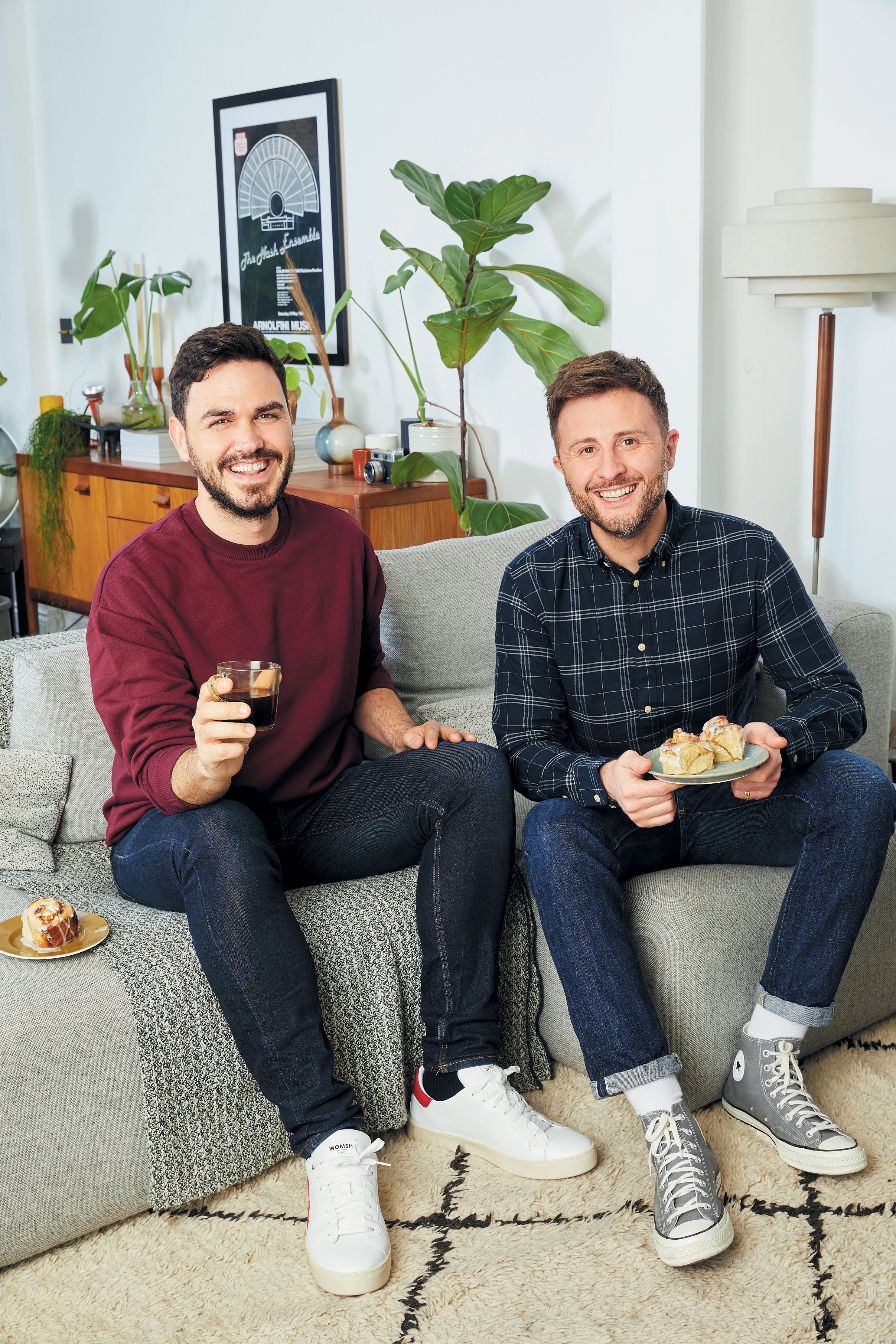How to survive Christmas as a vegan
Being vegan at Christmas is the least of your worries. A year of unpredictable weather means potatoes, broccoli and cauliflower could be missing from festive feasts this year. Hannah Twiggs speaks to BOSH! co-founder Ian Theasby about how to get around the shortage, the joy of plant-based roast dinners and his favourite festive recipes


Whether you’re tucking into turkey or making a mushroom wellington this year, there’s at least one thing both meat-eaters and vegans can agree on: Christmas dinner isn’t complete without roast potatoes.
So we should all be alarmed at the news of a shortage of spuds after a particularly difficult year for farmers. Heavy rainfall and flooding caused by Storms Agnes, Babet and Ciaran (not a punk band, but definitely should be) have produced a record low of 4.1 million tonnes of potatoes. Well, at least we can avoid arguing over whether to serve them mashed or roasted. Supplies of broccoli and cauliflower have also been badly affected.
But perhaps the news isn’t just another opportunity to moan about the weather, but to address an even more insidious issue with the way we eat in Britain.
“The storms that this country has experienced over the course of the last year have been quite irregular and abnormal in comparison to what’s happened in previous years. Some might say that those storms [have] a direct correlation to climate change,” points out Ian Theasby, one-half of the vegan chef duo BOSH!, a plant-based recipe channel founded in 2016 that has also churned out seven cookbooks. “And the funny thing is that what we are now going to suffer from, not having enough vegetables on our plates over Christmas, could have been prevented if we ate more of them in the first place. Eating more vegetables and less meat could potentially reverse and slow down climate change.”
It’s an argument we’ve all heard before but now beloved staple ingredients have started disappearing from our plates, perhaps it’s finally time to pay attention. The news comes after a study by Oxford’s professor of population health Peter Scarborough found that people who follow a plant-based diet account for 75 per cent less in greenhouse gas emissions, as well as cause significantly less harm to land, water and biodiversity. If you’re not ready to jump ship entirely, simply reducing your meat intake from the average 3.5 ounces per day to 1.7 ounces would be the equivalent of taking 8 million cars off the road.
But enough depressing statistics. It’s Christmas, after all! So, when faced with the very real possibility that three cornerstone Christmas vegetables might be in short supply, what would Theasby serve instead? “Do you know what, if you can’t find the veg that you need in the fresh area in the supermarket, frozen vegetables are actually really good,” he suggests. And he’s right. Freezing vegetables not only prevents food waste and extends their shelf life, but they’re often better for you because the nutrition is locked in when they’re frozen shortly after harvesting, rather than deteriorating during transport, on the shelf in the supermarket and in the fridge before you eat them.

If you are anxious about surviving the festive period as a vegan, Theasby, who’s been serving a plant-based Christmas dinner for the past eight years, says “the best thing to do is don’t shout about your newfound belief system because no one wants a pesky, annoying entity around the dinner table”. Instead, “what you need to do is answer questions about your new belief system if they arise, because it’s very important for people to be respectful of other people and their beliefs, especially during Christmas.” In that case, feel free to repurpose some of the depressing statistics above.
He also recommends that if you are following a plant-based diet, why not take the stress off whoever’s hosting and cook your own food? “For instance, if you are going home to see your parents, they cook all year, they might want to put their feet up at Christmas. It might be a great opportunity for you to offer to cook them Christmas dinner and that way you can show them just how tasty plant-based food can be. How wonderfully flavourful, how super healthy it is. How perfect is it for Christmas.”
And if people do get uppity about their Christmas dinner, “Listen, I’ve done Christmas dinner on a vegan diet for the past eight years. Trust me. My parents, who are full-blown meat-eaters, love the food that I cook for them.”
For Theasby, that food usually includes a portobello mushroom wellington as a centrepiece. Simply cook the mushrooms in the oven for around 15 minutes, blitz some chestnuts, pecans and bread then combine with cooked onions to create a paté, and parcel it all up like you would a regular wellington. “When you’re cutting it up, there’s the same theatre that you would expect when somebody’s cutting their Christmas ham or their Christmas turkey or their Christmas goose.”
Listen: I’ve done Christmas dinner on a vegan diet for the past eight years. Trust me. My parents, who are full-blown meat-eaters, love the food that I cook for them
We might think of Christmas food as being traditionally meat-heavy, but when you take away the turkey, the pigs in blankets and the gravy, it’s predominantly a plant-based meal. In Britain, it wasn’t that long ago that vegetables took pride of place on 25 December. As recently as the inter-war years between the Twenties and the Fifties, many families served up vegetarian feasts as meat was so scarce. Rationing meant only one in 10 families had a turkey at Christmas, and as vegetables were so readily available and many people grew them at home, they were relied upon to pad out the meal.
Today, “meat only makes up about a quarter of your Christmas dinner plate, if that. The rest of it is all 100 per cent plant-based,” says Theasby. So swapping out the big bird for a whopping wellington isn’t that much of an ask. A “really nice gravy”, which is usually made with the juices from the meat but is easily made plant-based, is also essential for tying the whole meal together. “It’s something that goes on literally every part of the meal. Therefore, if your gravy is good, it means that you set yourself up for having a good rest of the meal.”
You won’t run into too much trouble trying to make dessert vegan but during our conversation, I begin to think about cheese (as I often do). “If people are dead honest with you, vegan cheese is not the same and it isn’t as good,” Theasby admits, and he might be one of the first plant-based people I’ve heard do so. “However, having said that, if someone really wants to stick to their guns with veganism and absolutely needs some cheese to round off their meal, there’s a few fantastic artisanal cheese brands out there. You can get them at the local posh supermarket or a health food shop.” Vegan cheese is predominantly cashew-based, with a bit of flavouring and nutritional yeast to achieve the same sort of pongy flavour and creamy texture. Plant-based cheese has come a long way in the last few years, with “camemvert”, “shamembert”, “bree” and even blue cheeses available at mainstream supermarkets.
But they don’t come cheap – they’re often double the price of dairy-based cheese, though most plant-based meat alternatives like meat, bacon and chicken have dropped more in line with the price of beef, pork and poultry. In fact, if you are buying meat this Christmas, Theasby believes you should be paying more. “Turkeys should be expensive,” he says. “If someone’s buying a turkey for next to no money, it means they’ve not got a very good turkey. Even if turkey is expensive and it’s got a nice label from a nice place, the likelihood of it actually having a nice life probably wouldn’t be the case.
“When it comes to a purely vegetable-based meal, you can make an incredibly tasty meal for a very reasonable price, especially at Christmas when most veggies are super cheap,” he adds.
And while Theasby says that with vegan food “it’s true, you have to try a little bit harder and you have to think a little bit longer and you have to do a little bit more”, there’s more reward at the end. “What you’re left with is a meal that you know you’re going to appreciate because you’ve thought a little bit more, rather than just getting a turkey and whacking it in the oven. It’s really rewarding, and therefore, even tastier on Christmas Day.” That, and the fact you might be helping to curb the unpredictable weather that got us here in the first place.
When everything is said and done, though, the food at Christmas is “just an added bonus”, Theasby wants to remind us. “I think Christmas is all about the people you spend it with. They’re the most important part.”
Join our commenting forum
Join thought-provoking conversations, follow other Independent readers and see their replies
Comments
Bookmark popover
Removed from bookmarks